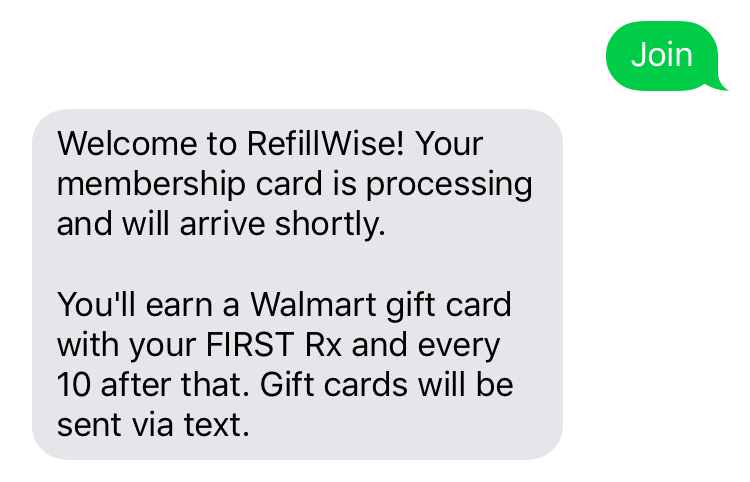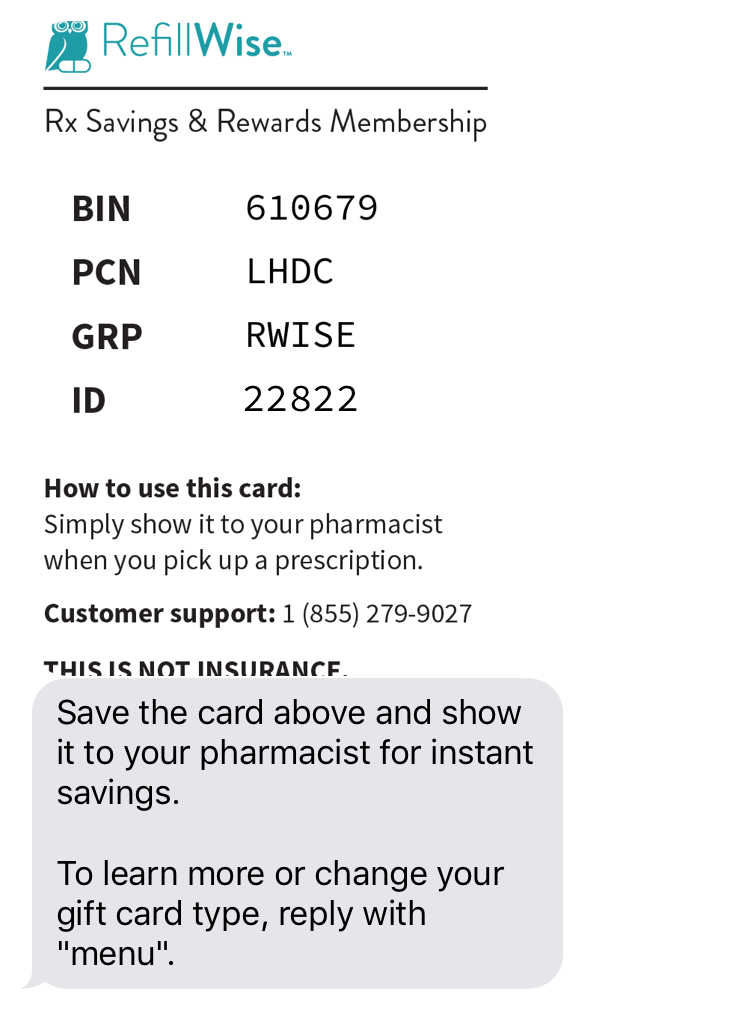
We offer members a pharmacy discount card - not a coupon - that earns cash rewards.
While coupons expire and are generally used one time, cards work forever, and your benefits will never expire. With your card, you never have to think about shopping by a certain date or at a specific place, or only for one particular prescription. It's free, yours to keep, and saves you money every time you use it, forever.
You get a $5 gift card the first time you use your card, then earn points every time you use your card. After every tenth visit, you receive another $5 gift card - which you can spend buying whatever you want. Coupons can only be used once, and do not help you purchase other items.
You have an option to get your card on your phone by texting JOIN to 22822, order a printed card through the mail, or request your card by email to download immediately. You are able to access the digital version from your phone or by logging onto the RefillWise website, or you can check your rewards balance via text.
Your RefillWise card never expires and can be used to buy prescription medicine for yourself, your friends, your family members, even your pets, your friends' pets ... any person or any animal in your care. While coupons are only valid for a limited time, RefillWise lasts forever and is meant to always be part of your prescription pick-up routine, so you save money in the short-term and earn rewards in the long-term. The more you use your discount card, the more rewards you will reap. And you can earn rewards from your grocery store or pharmacy at the same time.
Instant RefillWise savings and rewards can be earned at any major pharmacy by showing your card or mobile device, and rewards - which never expire - may be redeemed for any item you choose. Both provide significant advantages over a generic coupon.
As open enrollment begins, once again, change seems to be the one constant in health insurance. Several insurance companies announced they are leaving several health exchanges in 2017, including Aetna, United Healthcare and Humana. In addition, other smaller insurance companies, like Scott & White Health Plan are also leaving or reducing their participation in exchanges. How do these changes affect you? Well, that depends on your health insurance, healthcare needs, and where you live.

Your Insurance
If you're lucky enough to have insurance provided by your employer, these changes may not greatly affect you. And if you purchase your insurance through an agent or directly from an insurance company, there may or may not be significant changes. Aetna, United Healthcare, Humana, and many other insurance companies will continue to provide health insurance coverage outside of the exchanges. But if your current health insurance company is leaving your health exchange, you need to choose a new insurance plan. And even if your insurance company is still in your exchange, you may choose to change plans to save money. There are usually several plans available to suit different needs.
As you have probably experienced, changes to your insurance plan, even if you stay with the same company, may affect your health care. Many providers and pharmacies accept multiple types of insurance, so you may be able to keep your doctors and pharmacies, but if a plan no longer covers your providers, you will need to change providers next year or pay out-of-network fees for your medical care.
Your Healthcare Needs
Healthy adults who only see a doctor occasionally and do not take regular medication will of course be least affected by these changes. But, the point of health insurance is to cover necessary medical care. The more care you need, the more important it is to know what care costs and who provides it. Plans do not always cover the best specialists or medications for every condition. If you or your dependents regularly see a physician or need prescription for a chronic health condition, and your doctor or medicine are no longer covered by the plans available to you this year, you might need to change your provider.
Location
Your location determines how much the changes in the health insurance exchanges will affect you and your healthcare. Families in many large metropolitan areas will continue to have a choice of several insurance providers, and that competition is helpful in keeping rates lower. Unfortunately, in some areas, you may only have one option on the exchange. Without competition, it is possible that the sole insurance provider will cut costs by limiting access to providers and what drugs are covered by their plan.
Smart Choices
If these changes in health care significantly affect you or family members you care for by limiting your choices or raising the cost of your health care, here are some smart choices you can make:
Research. Make sure you understand what your plan does and does not cover.
Shop around. Hire a broker to find plans that fit your budget and provide the coverage you want.
Use RefillWise. Insurance isn't the only way to afford needed medicine. RefillWise can save you money on prescriptions not covered by your plan, and in some cases buying a prescription with your RefillWise card may be less expensive than your insurance copay.
As our earlier blog posts highlights, RefillWise launched a new, innovative texting interface that makes it easier for you to receive your free discount card. It only requires two simple steps. Here's how it works:
Step 1: Text “Join” to 22822.

Step 2: Receive your card.

Because you receive your card — quickly — there are no further steps to take. But if you have any other questions, text "menu" to see what else you can do with RefillWise by Text.
If you need help understanding how to use your card, text "1."
If you would like to receive another copy of your card, text "2."
If you would like to change your reward type, text "3."
If you would like to see the status of your savings and rewards, text "4."
If you would like to contact the RefillWise team by phone or email, text "5."
Now, you don't have to worry about ensuring you have your card, since it's with you on your phone at all times. And signing up only takes two simple steps that can be completed in less than two minutes.

The Setup
You're sick. Again. Maybe it's a one time illness, possibly something chronic that isn't responding to the medication already prescribed. You talk with your doctor, explain your symptoms, and she examines you and writes you a prescription. You drive to the pharmacy to pick it up, give your insurance card to the pharmacist, and wait for it to be filled.
This should be simple.
The Shock
The pharmacist comes back and tells you, "I need to let you know that your insurance doesn't cover this prescription." What? So, you ask how much it will be. They give you a number. Maybe $300, $400, even $900 or more. You are stunned. You pay a lot of money every month for your insurance coverage. How is it that your prescription isn't covered?
The Scoop
Most people assume that when they go to the doctor, any prescription written by the doctor is the best choice and they can expect their insurance to cover it. Unfortunately, as with all health care these days, it's not that simple.
Every pharmacy benefit manager (PBM) has a list of drug exclusions - prescription drugs that they do not cover. They ask you, as on this 2017 ExpressScripts Preferred Drug List Exclusions, to avoid paying full price by requesting your doctor write a new alternative prescription.
Often there is a generic medication that is just as effective as the excluded medication, but sometimes the medication they suggest is chemically different and does not have a low-cost generic equivalent. This can be a major medical issue for people in need of these medications.
So, what is going on here? Why wouldn't insurance cover the prescription your doctor thinks is best fit for you?
The answer? Money.
PBMs and drug manufacturers argue about the cost of prescriptions. If a manufacturer doesn't give the PBM the price they want, they will exclude it from coverage. And the PBMs aren't completely crazy. Drug manufacturers are known to arbitrarily raise the price of drugs well above what is necessary. The recent EpiPen controversy is only one instance of this industry practice. Also, doctors may receive incentives if they prescribe certain medications. The drug you've been prescribed may be more expensive than you can afford, or may not the only choice for your condition. As PBMs compete for business, they work to keep costs low for both themselves and the employers they serve — which means the cost gets pushed to you. This is why you may be surprised at how much it will cost you if you go to a pharmacy with a prescription for a drug or device excluded by your insurance.
The Solution
Your health is necessarily your top priority, and that's why we're here to help you.
If you find yourself in this situation, you do have options.
You can go without the medication. Not recommended, but people do it.
You can request that your doctor write you a prescription for an alternative medication covered by your insurance. The risk is, your doctor may not be willing and it will take extra time, or it might not be as effective as the one initially prescribed.
You can use your RefillWise card. You may be surprised how much it can save you.
RefillWise can help you afford medications that are excluded from other plans. If your prescription isn't covered and you find yourself having to pay full price at the pharmacy, use your RefillWise card to check for discounts.
RefillWise is designed to save you money at the pharmacy. It fills holes in prescription coverage and gives you discounts if you don't have insurance.
But sometimes, just getting prescriptions authorized can take days or weeks or months, especially if you are one of the millions of people who use Medicaid for your primary or secondary insurance. Every prescription — whether for a drug, or a procedure, or equipment — requires an authorization. The backlog is sometimes more than 60 days just to receive your paperwork. Approval can take even longer. You can have your prescription denied because the paperwork wasn't correctly completed or it was missing a signature — or some other misunderstanding. Poor communication may delay — or prevent — getting needed medication.
This happened recently to Christine*. She was struggling with depression and needed medication to treat it. Her doctor prescribed her something, but she couldn't purchase her prescription immediately because she had to wait for authorization from Medicaid. Days went by while she struggled to manage her health. She called daily to check and the answer was always, "No, not yet."
In these types of situations, one of the most helpful resources is your State Senator or Representative. I contacted mine recently for an issue with Medicaid and I was amazed at how quickly our problem was solved.
Our Story
My oldest son is bright, funny, tenacious, and stubborn. He wants to be an engineer or a doctor when he grows up, or maybe a pirate. He's five, so he has time to decide. He loves to read, and his favorite subjects are math and science. But, if you met him, you wouldn't notice those things first. You would see the brace on his leg or the funny way he talks. You might notice that he has odd mannerisms and walks with a limp. That's because my son has a form of cerebral palsy called hemiplegia that was caused by a neonatal stroke.
He has difficulty using the right side of his body and also has a severe speech delay and several other learning and processing differences. He spends hours in therapy every week and uses devices like his orthosis and Alternative Communication Device that help him walk around and communicate. My son also needs regular treatments of Botox to help his muscles relax so he can walk.

Like many families with special needs children, we have two types of insurance for our child. We have primary insurance through an employer and we rely on Medicaid as our secondary insurance so that we can afford the therapies, devices, and treatments that help our son thrive. For every appointment or procedure our primary insurance is billed, just like normal — but anything they don't cover is billed to Medicaid. For instance, we use all of the 60 therapy sessions our primary insurance allows, but since that only covers about 10 weeks of the year, we use Medicaid to cover the rest. Just like with insurance, we have to prove that the therapy, device or treatment complies with Medicaid's strict rules.
Medicaid requires that our son be tested every six months to make sure he is meeting his therapy goals. They also take much longer to issue authorizations for his treatments and equipment than our private insurance does. It is a hassle, but it is worth it because the cost for all his medical needs is too much for us to manage without Medicaid.
Recently, though, I got a phone call saying that his authorization for therapies was denied. When I called Medicaid they said that someone at their company had flagged our son's authorization saying they needed a nurse to reevaluate if he really needed what the therapists prescribed. I spent hours on the phone talking with Medicaid and our therapy clinic trying to solve this and nobody seemed to know what was wrong or what to do next. Meanwhile, our son's therapy visits were cancelled because there was no insurance to cover them.
I was desperate, so I reached out to my State Senator Van Taylor hoping that I could at least give him some feedback about what was happening to real families using Medicaid as secondary insurance. To my surprise, someone from his office called me within an hour to ask if they could advocate for us with Medicaid. I signed the paperwork authorizing them to call Medicaid, and within a couple days someone from Medicaid called me back and the authorization was complete less than an hour later.
I'm so glad I reached out for help. Since then, I've learned a lot more about how State Senators and Representatives work. Their helpfulness was immediate and they showed genuine concern for us and our problem.
It is the job of our representatives to help advocate for us when we have problems with state services.
The Takeaway
If you have Medicaid coverage and can't get your prescription authorized, you are not without options.
Contact your State Senator or Representative to see if they can help you. You can find out who represents you here.
Call and check on the status of your authorization to see if you can help things go faster.
If you need a prescription and Medicaid has not yet authorized it, consider using RefillWise meanwhile to get a discount at the pharmacy.






